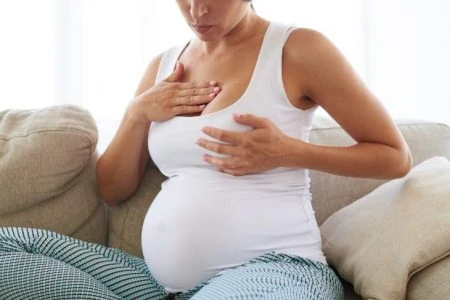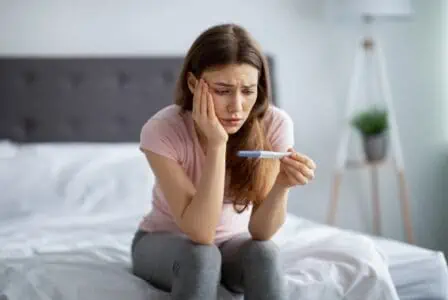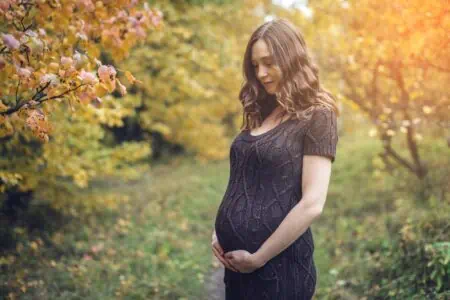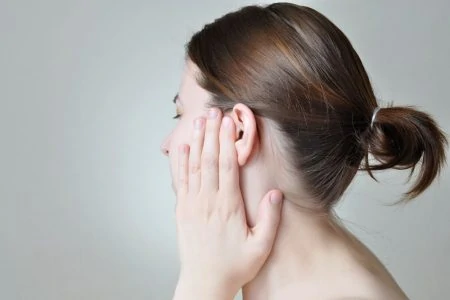Are you pregnant and unable to ignore the aching and throbbing in your breasts?
Most women will have some breast soreness during the first trimester, usually starting during the fourth week and ending around the 14th week. For some women, it’s the earliest symptom of pregnancy, and for some, it lasts right until the early stages of labor.
Although breast pain is a super common experience during pregnancy (we’ve been there!), we understand that it may cause you some concern, and you’re probably looking for ways to relieve the discomfort.
We’ll discuss the reasons for breast pain during pregnancy, answer all your questions, and offer our tips for breast pain relief.
Key Takeaways
- Breast pain is a common experience during pregnancy, usually starting in the fourth week and ending around the 14th week.
- Breast soreness can also be caused by premenstrual syndrome, birth control pills, hormonal imbalances, or a poorly fitted bra.
- It is important to check for other signs of hormone troubles and changes in the breasts.
- Estrogen and progesterone spike during pregnancy, preparing the womb for the fetus and causing breast development.
- Tips for relief include properly fitting bras, warm compresses, and over-the-counter pain relievers.
Is It Pregnancy or PMS?
This is a very important question. Many of us experience breast soreness because of premenstrual syndrome or birth control pills. This is due to alternating levels of hormones — specifically, estrogen and progesterone — which cause many of the symptoms women experience during pregnancy.
Just because you’re feeling sore doesn’t mean you are pregnant.
If your cycle is regular, you can check whether your period is due in the next 1 to 5 days. If it is, and if you’re not experiencing any other unusual symptoms, PMS is a possible culprit.
If you are feeling sick or experiencing spotting, you might be pregnant. This is even more likely if your period is late.
Remember
Of course, the only close to surefire way of knowing if you are pregnant is to take a pregnancy test. These can still give us a false positive or a false negative, but in most cases, you will have an answer in your hand in minutes (1).
Can Anything Else Cause This Soreness?
Your menstrual cycle, the pill, rough handling during sex, and even menopause can cause breast soreness. So can a hormonal imbalance, a poorly fitted bra, an infection, or a growth.
To check for hormonal issues, including the pill and a hormonal imbalance, look for other signs of hormone troubles, such as a sudden onset of acne. But bear in mind that pregnancy can also cause hormonal issues, so take a pregnancy test to be sure.
To check for physical problems such as bruising, first of all, ask yourself if you have had anything happen to your breasts that could have bruised them.
Rough sex, walking into something, or sleeping funny can cause some serious pain. Look all over for red or purple marks.
To check if your bra is fitted properly, make sure your breasts rest in the cups without sinking or overflowing, that the strap is tight without digging in, and that the shoulder straps are comfortable but taut.
Get A Fitting
Finally, make sure to check your breasts for changes regularly. Breast soreness can be an early warning sign of breast cancer, so you need to make sure to check for lumps or other changes. Pain from cancer will usually be felt in only one breast, while with most of the other hormonal reasons mentioned, the soreness is felt in both breasts.
Why Do My Breasts Hurt During Pregnancy?
When you get pregnant, the hormones estrogen and progesterone spike. This helps the womb prepare a lining for the fetus to implant safely and discourages that lining from coming loose unnecessarily.
What is more, when pregnant, your breasts will be at their final stages of development. This is why some women who don’t have soreness during their periods will still experience breast pain during pregnancy.
The glands are getting bigger, more fat is growing, blood flow is increased in the area, and the cell types are even changing! All of this can add up to breast pain (3).
Only My Nipples Are Tender. Is This the Same Thing?
Some women do not feel much breast soreness but instead experience tender nipples. This is sort of related, but not always the same thing.
Your whole breast is likely to feel sore when you are pregnant, but if it is specifically your nipples that are sore, you might be getting close to producing milk. That’s especially true if you are in your third trimester.
As you get nearer to lactating, your nipples, specifically the areola or dark area around your nipple, will grow darker and larger, and you may notice a small collection of pores opening on the tip of your nipples. They may be very sore, sensitive, and even itchy as this happens. You might notice little drops forming as well.
Raised bumps that feel like goosebumps around your areola are called Montgomery tubercles. No need to worry; these are glands that help lubricate the area and prevent germs from forming.
It Hurts More When I…
There are so many things that can make breast pain worse during pregnancy.
Some women find eating certain foods makes the soreness worse. Others find they feel particularly sore during sex or after an orgasm. This is all related to your hormones, and since some foods can affect your hormone levels, such as soy products and estrogen, it is best to avoid those.
There is no set list of things that will make your soreness worse or better. It’s different from woman to woman.
The only advice I can offer you is to avoid whatever is making you sore, whether it’s a food, an activity, or an item of clothing.
It’s Just Temporary
It Hurts, but They Aren’t Growing at All
Don’t fret. Not everyone’s breasts grow very much in the earlier stages of pregnancy.
Many women find their breasts don’t grow at all during pregnancy. Soreness and growth do not have to happen at once and may not happen at the same time at all for you.
This is perfectly normal, and as long as your pregnancy is progressing, there is no problem.
Chances are, your breasts will swell after giving birth. Many women experience a sudden surge in size, a process called engorgement, as their milk comes in but not before.
And even if they don’t grow at all, ever, as long as you are producing milk normally or bottle feeding, it won’t be a problem for you or your baby.
Although breast size varies from woman to woman, breasts will usually increase in size at least a little with milk production.
Editor's Note:
Dr. Njoud Jweihan, MDThere is no need to stop reading if your breasts are sore but not growing. The same pain relief tips and tricks apply whether or not your breasts are growing. And breast changes are different from pregnancy to pregnancy, so this information may continue to be beneficial in the long run.
The First Trimester Is Over, and It Still Hurts
Breast pain will usually go away at the start of the second trimester, but not always.
For some women, breast soreness carries on throughout pregnancy, especially when it is the first pregnancy and the body is not familiar with all the changes it is going through. This doesn’t mean anything is wrong; it just means that, like during puberty, the changes are happening very quickly, and you are a little more sensitive to them.
Some women also experience surges of pain and tenderness. These are something you want to keep a closer eye on because even though they can be perfectly harmless, they could also be symptoms of issues like infections or growths.
Be On The Safe Side
You may go without soreness for months only to get sore again in your eighth or ninth month. This is normal too and usually means your body is starting to prepare for birth, lactation, or breastfeeding.
How to Relieve Breast Pain During Pregnancy
If you are experiencing breast pain during pregnancy, we have some easy solutions.
For starters, there are many simple, over-the-counter painkillers and anti-inflammatory medicines that are perfectly safe to take during pregnancy. Talk to your doctor or midwife about these options. According to many mothers, Tylenol usually works in these circumstances.
You may also find you are more comfortable if you change your bra. Get fitted regularly throughout your pregnancy to ensure you are wearing the right maternity bra and it’s not too tight.
Choose one without an underwire so it can adapt to your changing breasts. Some women choose to wear oversized sports bras during the first trimester and nursing bras during the second and third trimester for this reason.
And you may want to try hot and cold compresses, which can encourage better blood flow, reduced inflammation, and faster cell recovery. Use warm compresses when experiencing standard soreness or itching but cold ones when you feel tender or swollen (4).
Drinking more water and reducing the amount of salt you eat can help reduce water retention. As water retention can make your breasts more swollen and painful, this can really help.
Editor's Note:
Dr. Njoud Jweihan, MDMilk Is Coming Out. Is This Normal?
We often expect not to lactate until we are close to giving birth or have already given birth. Most women will leak a little bit during the last month, and that is a good time to invest in some good nursing pads. In most cases, the fluid is colostrum — the milky fluid produced just before breast milk.
You can start lactating at any point during pregnancy, even from the very start, but this usually begins in the second trimester since that is when you start to produce colostrum.
And as long as everything else is normal, there is no problem with this. That said, it’s a good idea to keep an eye on any leakage, even if you think it’s milk. Check for any swelling, redness, or lumps if you notice your breasts are leaking.
If you notice any odd signs, such as bloody discharge, or if you are just feeling worried and need reassurance, see your doctor to rule out anything more serious.
Signs of Mastitis To Look Out For
If you are lactating before your baby arrives, you need to watch for signs of mastitis or another breast infection.
Normally, mastitis is caused by your nipple cracking when you are breastfeeding, which lets bacteria from the baby’s mouth into your breast, where it multiplies in the milk ducts. But mastitis and other infections can also happen in lactating women.
If your breasts are feeling very sore and warm, there is a hard area that’s red and hot, and you are experiencing fever, then you might have a breast infection. Women with diabetes or women with weakened immune systems are more at risk.
Make sure to see your doctor if you have any of these symptoms (5).
Other Trouble Signs
Unfortunately, being pregnant does not make you immune to things like breast cancer. The signs and symptoms of pregnancy can hide the symptoms of breast cancer, making it harder to spot.
Even doctors can have a hard time checking and monitoring symptoms in pregnant women because there is so much overlap between the signs of breast cancer and regular breast changes.
Make sure to watch for any sudden changes in your breasts, especially the growth of a hard lump, one breast becoming much larger than the other, and dramatic breast shape changes. You may also experience leaking, bleeding from the nipple, changes in the skin such as an orange peel appearance, or discharge that has an odd color. The sudden inversion of a nipple should be looked at as a possible sign of breast cancer. Keep in mind, different types of breast cancer tend to produce different symptoms, and some might not be painful at all.
If you have any of these symptoms, talk to your doctor immediately so they can arrange a mammogram or an MRI to work out what is causing them.
FAQs
The Bottom Line
Breast pain or soreness during pregnancy is perfectly normal and usually nothing to worry about. It can take many different forms, and as long as your doctor or midwife is not worried and your pregnancy is carrying on normally, it is probably normal for you.
That’s comforting to know but does nothing to take the soreness away. Try out some of the above remedies to help you through it.










